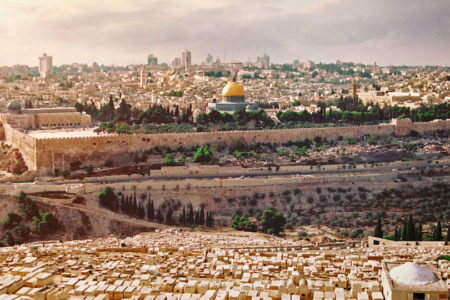Don’t Forget To Give Thanks
We seem to be hearing “Thank you” less often these days, and it’s not a good sign. Some grumpy people go so far as to complain about store clerks who cheerily urge us to “Have a good day!” I, for one, think most of us prefer being thanked to being ignored or enduring an attitude bordering on “Why are you wasting my time?”
This absence of a desire to express gratitude for service rendered or done in the name of simple civility, however, may be a symptom of something more disturbing: evidence of a nation in trouble.
A biblical review of the national life of Israel provides abundant proof of just how costly a lack of thankfulness can be. Inherent in every festive occasion for the Jewish people was a specific element of thanksgiving. When the nation forgot to publicly recognize the goodness of God, its forgetfulness was always accompanied by a spiritual decline.
When Israel was on the brink of excursion into 70 years of captivity in Babylon, God let them know in no uncertain terms what their problems were. Immorality and idolatry plagued the nation and turned the hearts of the people away from the Lord. Heading the bill of indictments found in the Book of Habakkuk is a phrase that really says it all about how far the nation had fallen: “and cannot be satisfied” (Hab. 2:5). Israel, like the nations around them, had been afflicted by a wave of ingratitude that was the first cause in bringing down the nation. It seems that everything else that was wrong grew out of the failure to be thankful.
Unthankfulness: A Pattern to Avoid
Just how seriously God takes the failure to say “Thank you” and mean it is described in Romans 1. From verses 21–32 we find a chilling spiral, one that is finally written over by the words, “judgment of God.” In other words, Israel is not alone among those warned to avoid ingratitude. All who know God are put on notice.
“Because, when they knew God, they glorified him not as God, neither were thankful, but became vain in their imaginations, and their foolish heart was darkened” (v. 21, italics added).
What follows is precisely the pattern found in the experience of ancient Israel: idolatry and rampant immorality. The Lord’s response can also be measured against what He exacted from His Chosen People. Ingratitude resulted in bondage, and many of the formerly favored people died in another country, far from the lush Promised Land.
The Romans passage illustrates what happens when people blessed with abundance forget the source of the bounty they enjoy. Failure to recognize that God alone is the giver of all good things is fatal. It is then that people begin to believe that contentment is in what they possess, not in who possesses them. When this occurs, there can never be enough. Therefore, both joy and contentment are gone, and ingratitude begins to reap a fearful harvest.
Paul, the apostle, told it like it should be for people who keep the focus on the giver, not on the things received. “Not that I speak in respect of want,” he said, “for I have learned, in whatever state I am, in this to be content. I know both how to be abased, and I know how to abound; everywhere and in all things I am instructed both to be full and to be hungry, both to abound and to suffer need” (Phil. 4:11–12). These are the words of a man who had learned the meaning of having what is enough. In plenty or in poverty, he could say, “I am satisfied; it is enough!”
At the heart of all that he said, however, was his confidence in the provider. This makes all the difference because it introduces us to one of the greatest truths in all of Scripture—and in life itself.
“I can,” the apostle exclaimed, “do all things through Christ, who strengtheneth me” (Phil. 4:13).
Little or much is not the defining issue of life. It is that the sufficiency of Christ surpasses every condition we enjoy or endure. Without Him, everything is measured by how many “creature comforts” surround us.
During the recent election campaign in Russia, a journalist asked people how they were going to vote. “I’m voting for the Communists,” said an elderly woman who was standing outside a church. When asked why, as a Christian, she would opt to return to Communist rule, she replied: “Well, although they treated us badly, they gave us something to eat.” While we may find her attitude rather astonishing, it is the common lot of those who bow to provision, at whatever price, rather than to the provider. Need we be reminded that millions of professing Christians in America will go to the polls in 1996 to vote on their views on the state of the economy rather than on the spiritual factors to be affected by their decision? How things have changed.
Thanksgiving: The America That Was
The Pilgrims’ landing at Plymouth, Massachusetts, on December 21, 1620, was anything but a heartening experience. True, they had reached their destination; but privation, illness, and hunger were awaiting their arrival.
Their first winter in the new world looked as though it might be their last. Of the 100 Pilgrims who waded ashore in the icy waters, barely half survived to see the spring. Scurvy and pneumonia exacted a fearful toll upon them. Had it not been for friendly Indians, those Pilgrims who remained may not have made it through the next crucial season. But, instructed by the natives, they planted crops, harvested them, and laid up meager stores against the coming winter.
In the fall of 1621, probably in late November, the Pilgrims set aside a time for a Thanksgiving harvest festival. As was their custom, regular occasions were dedicated to thanksgiving for rain, good crops, and other manifestations of God’s goodness and mercy.
This oldest of harvest festivals was celebrated around tables laden with Indian corn, barley, cod, bass, waterfowl, turkey, and five deer contributed by their special guests, the Indians. It was obviously a season when people who had suffered severe losses and much privation had a lot of suffering to complain about. There was also the uncertainty of what lay ahead for them, what with back-breaking labor, other Indians who were hostile, and sponsors who didn’t seem overly concerned about how they fared.
But they were not alone, and they knew it. The new land offered the freedom to worship God without restraint and give Him the adoration and life-commitment that was His due without fear of reprisals from frowning “churchmen” or oppressive government officials. Thanksgiving, for them, was a celebration of the spirit that surpassed by far the joy of food and a brief respite from the day-to-day rigors of life in the wilderness.
Unthankful: Taking Stock
It seems to me that the time has long since passed when Americans as citizens, and Christians in particular, must look back and take stock of just where we have gone astray, and there is no better time to catch up than now. A good starting point would be to take a look around and see just what we value at this Thanksgiving. Millions of us, after having devoured sumptuous meals, will rush to our TVs to spend the holiday watching athletes making astronomical salaries chase footballs up and down fields surrounded by stands filled with worshipers of pigskins and players. During the Olympics—with the regaling of pagan traditions—a social analyst observed that America was now a country where the center of life in our great cities is no longer concentrated in churches, municipal buildings, or cultural centers, but in huge sports complexes. While a majority of merchants and economic planners see Thanksgiving as little more than a launching pad for the Christmas spending extravaganza, sports and assorted secular distractions seem to have stripped millions of people of the ability to give God (and what He has given us) a thought. In the process, we are rapidly becoming a nation of ingrates—people for whom too much is never enough. We do it to our own peril.
Thankless: Don’t Say We Haven’t Been Warned
In the Romans 1 passage alluded to above, two inescapable consequences resulted from failing to be thankful. First, there was a demand for a new order.
“And changed the glory of the incorruptible God into an image made like corruptible man, and birds, and four-footed beasts, and creeping things” (v. 23).
This is the idolatry noted in Habakkuk 2, but with a slightly different twist. The objects of adoration are men and creatures. People are worshiping “Mother Earth” with a devotion that sees the “old order” as a threat—with man as the primary oppressor of the creatures whose territory he has ruthlessly invaded.
The aggressive “old order” man in this scenario is the one who kept God in his knowledge, retained the ability to give God the glory due Him, and held to a thankful spirit.
The most infamous of the thankless “new order” liberation movement is the supreme act of idolatry.
“Who exchanged the truth of God for a lie, and worshiped and served the creature more than the Creator, who is blessed forever” (v. 25).
The idea is that man has displaced God. The planet is now occupied by a family of self-proclaimed gods dedicated to a new regime liberated from divine truth and Creator God.
To say that we’ve come a long way since that first Thanksgiving in 1621 is, of course, an understatement. But how far have we really come? As far as the Garden of Eden. Whether we like to admit it or not, we are witnesses to the ultimate triumph of Satan in the battle for the souls of men. It was in the garden that Satan promised the first family that if they violated the divine prohibitions, they would “be as God” (Gen. 3:5). Today we are hearing it in our own ears: declarations of independence from God and His Christ and assertions by some of having themselves become lords of the Earth.
Millennium: The Great Thanksgiving Day
Believers understand that we are not reading the last chapter. The spiral that began with the failure to be thankful, and ended in mankind’s not wanting to “retain God in their knowledge” (v. 28), only serves as notification that we are nearing the end. It also heralds the news that the great day of Thanksgiving is just over the horizon.
When all is said and done—the “last days” lived out, the Rapture of the church a reality, and the thunders of the Great Tribulation heard no more—the Son of God will take His throne in Jerusalem.
“And the Lᴏʀᴅ shall be king over all the earth” (Zech. 14:9).
Then the great day of celebration will begin. Thanksgiving will dominate the reunion of Israel and the saved of the nations during a full one thousand years.
“And it shall come to pass that every one that is left of all the nations which came against Jerusalem shall even go up from year to year to worship the King, the Lᴏʀᴅ of hosts, and to keep the feast of tabernacles” (Zech. 14:16).
Tabernacles was ancient Israel’s great festive season of thanksgiving. It was their national harvest celebration. It is not inconsequential that God has chosen to reinstitute the greatest of thanksgiving feasts in the Millennium. Look at it this way: All true thanksgivings today are only a warm-up for those we will celebrate at the coming of the King.







